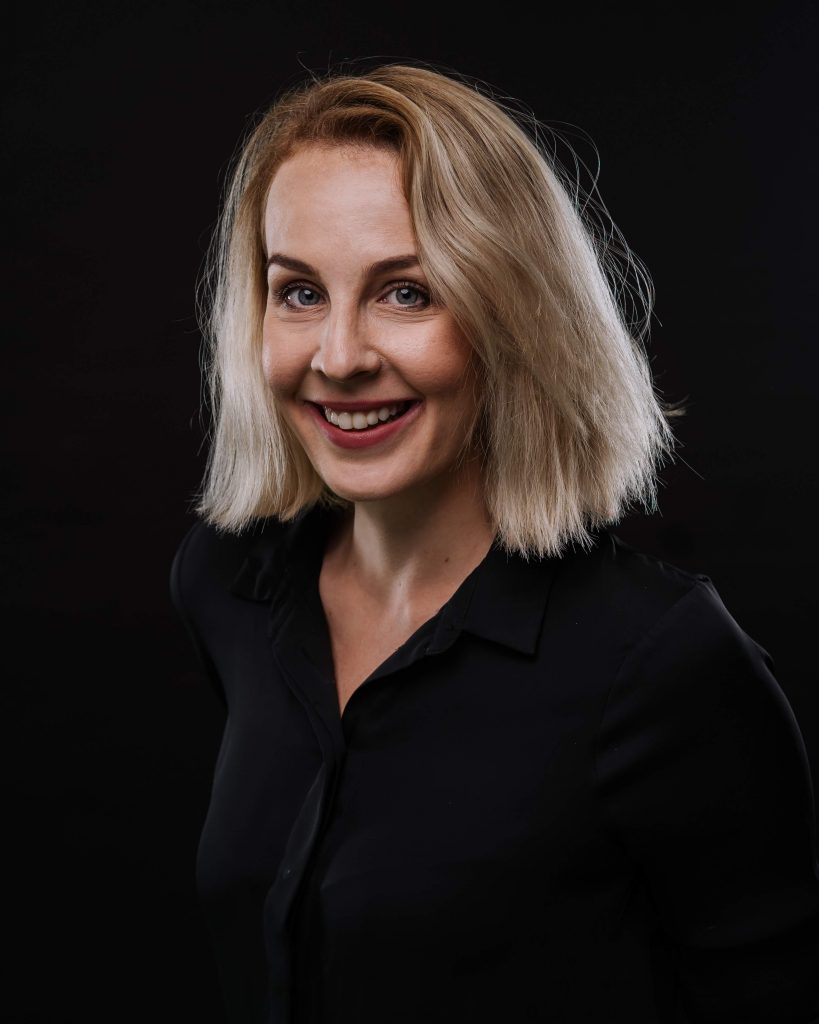 Slovakia
Slovakia
Maria Vircikova – Technology Innovator and Entrepreneur
Maria, you are both technology innovator and entrepreneur, working on a very exciting project at Matsuko. Could you tell us a little bit about your background and Matsuko?
My passion is to develop technology that is human-centric with a positive social impact. My father was a professor of civil engineering; a great mathematician, who was designing famous bridges that connect people. The technology that we are building in Matsuko also connects people using mathematics.
My previous research at university was focused on building better robots that serve people, giving them emotional expressions and what we call ‘empathy’, so that they could connect to people more naturally.
My interest has always been in understanding human behaviour using technology and, looking at it the other way round: Creating technology that adapts to human behaviour and expectations. And, I like interdisciplinary work: Combining knowledge from different fields that are interesting to me, for example, machine learning and psychology.
In Matsuko we are developing holographic communication that fills in the missing element in video conferences. The essence of communication: Our presence. We believe that it brings people closer, improving relationships and thus collaboration; while zeroing down the environmental impact.
Before Matsuko, you were working in academia; experimenting in the field of human-robot interaction. How did you find working in academia and how does it compare to the private sector?
I realized that the most important factor that influences my satisfaction in projects is the people around me. After finishing my PhD I thought that I could finally work in a research team, but it was practically impossible. I had always been in contact with people from all over the world, with similar interests, but I was not part of any team. At university, you can only start forming your own research group after you become an assistant professor and I was not sure if I could retain my motivation and passion until then. However, I love academia. Both my parents were university professors and I wish to return to it in the future. I appreciate the opinions of young people; their vision and passion. Today, I have much more responsibility. That comes hand in hand with freedom. I can choose the people I cooperate with and I feel I am growing as a leader. We are not only developing a product; we are building a company. In academia, young people do not usually become executives.
You are not just working in Matsuko as a machine learning researcher, but you are also the co-founder, is that correct? What have led you to start this company?
We are two CEOs. My co-founder is a genius in mathematics who was the leader of a prestigious award-winning team in the gaming industry. They were creating the most realistic human behaviour ever seen in video games, for the famous Assassin’s Creed franchise that generates over a billion euros per year. Having him with me, is an ideal setup. We are combining knowledge from two different fields: Machine learning and 3D technology. Moreover, we complement each other in almost everything: He likes excel tables and finances; I like beautiful slides and pitches on stage. He is a visionary who sometimes loses track of time; I crave a clear strategy and focus. Of course, Matsuko is much more than just the two of us. We are a team of over 30 creative minds, holding 30 patents, with hundreds of publications, PhDs in Artificial intelligence and multiple awards in business and innovation. We have a global network and presence in Canada and more recently Paris at Station F (the world’s largest business incubator). Matsuko existed before as a studio working on many projects: From computer games to augmented reality installations and for different clients: from medical companies to game publishers. We decided to focus on one product and change from a service oriented- to a product oriented-company.
You have just successfully raised another round of funding, congratulations! What are your goals for the foreseeable future?
Investors have seen the potential in Matsuko and we have raised 2.5 million euros. We used this to build the team and create our human torso hologram. We were lucky to close the last investment round in February. We selected smart, experienced investors with a good network, for example Oktogon Ventures. One of the partners is Gyula Fehér, the founder of video streaming start-up Ustream, acquired by IBM. My personal business plan for this year was to reinforce our business in France. We have a good network there, with beauty tech brands and telcos, who are early adopters of our technology. We were selected by L’Oreal to join their Open Innovation Programme and Matsuko became a member of the world’s largest business incubator, Station F. I was in Paris with my family (I have an 18-month old baby girl) but when the Covid-19 appeared in France, we decided to come back home.
These are difficult times for businesses, but for Matsuko, this can be the opportunity of a lifetime! Imagine those masses of people around the globe working remotely. Having this in mind motivates us even more and we are working harder than ever to get ready fast. New mixed reality glasses are coming to the market: We are partnering with select clients who love the idea of bringing a new level of communication.
Matsuko has huge potential and aims to bring holograms to remote communication. It sounds super exciting to imagine that you can communicate as a life-like, 3D hologram. Can you tell us about your product?
Digital communication tools and platforms connect people and enable information exchange. Yet, they are far from perfect for conveying non-verbal content. The thing which, as we know, often makes all the difference. Our vision is to revolutionize the way organizations and people communicate today. We aim to create enabling-spaces based on trust and belonging, improving our communicative behavior. In the new world, which I believe is inevitable and will redefine the way we work, communicate and live. Holographic communication provides for all that!
How does it work? It is as simple as putting your sunglasses on. When it is time for a meeting, you open an application similar to the usual video conferencing we know today. You click on it to start the meeting …. and the experience changes as you put the mixed reality glasses on. At this point, people from the screen are immediately present as a realistic hologram in the highest quality you can imagine. Once the holograms on both sides have been activated, the meeting can begin as though the participants are face to face. Everyone sees and experiences gestures, eye contact and body language. This is extremely important for communication as 90% of what people remember during communication is non-verbal. That is why it is more important HOW you say something than WHAT you say. That’s why Matsuko is the missing element in video conferencing.
We are currently in the Covid-19 crisis, where working from home and teleconferencing have become essential. How do you imagine your tech will change the world of remote communication, not just every day, but in a crisis like we are facing?
More than ever before, people need to work and communicate across borders and there are many reasons to avoid travel: Saving time, saving resources, reducing your carbon footprint. According to Harvard Business Review, 43% of people are working from home. This has increased rapidly during the Covid-19 crisis. By using our app and just a phone or a computer, we can communicate with our colleagues face to face as human holograms and without the need of travel. Anyone, anywhere, any time and in real time, can communicate as though they were looking at one another. Remote meetings will become more efficient, and many businesses will no longer need to send their employees on international flights for a meeting. This will have a direct positive impact on the environment as the carbon footprint will be reduced.
You are a super woman, involved in science, tech and entrepreneurship. Do you see a synergy between these fields?
In examples like ours, science, technology and entrepreneurship are a single field, as we are a deep-tech company. We work closely with universities; we follow the global research and operate at the state of the art in our fields. I understand the power of communities. I helped to organize different meetups to connect people interested in machine learning, games development or in start-ups and entrepreneurship. It is all about people. And the active people know each other. One day, they are in academia, the next, they start their own business, or become executives in corporations – or even investors. Their roles change, but the people are the same.
What motivated you to focus on machine learning; a field that is not yet very popular in this geographical area?
Artificial intelligence is the top field to be in today. The ‘creme de la crème’. Sometimes I hear that it is a hype: Usually from people who do not have a clue about its possibilities. For me, the whole world is my area. However, I live in Slovakia and I want my country to be more open to digital innovations. The automotive sector is among the fastest growing and driving will be fully automated in the near future. The automotive industry is a huge application field for machine learning. I think that we still have an unexploited potential to develop such innovations.
Are there challenges that you face in your area of expertise as a woman?
I am a member of Aj ty v IT, a Slovak non-profit organization helping girls and women in their studies and career in tech. I also support different programs to promote women in tech and into leadership positions. I decided to study human-robot interaction after I visited the MIT group of Cynthia Breazeal, a pioneer of social robotics. It completely changed my mind about robotics as before this, I had only met male roboticists. It is important to overcome these obstacles which are in our minds. In future, I would like to be an investor looking for investment opportunities in deep-tech companies or in companies with a strong social impact – and I would openly prefer female founded companies. I read a study in Fortune magazine, that in 2018, all the female founders combined received $10 billion less in funding than one e-cigarette company took by itself: That is little more than 2 per cent of all the tech investment. It’s an alarming number.
If you could inspire even one girl or woman to follow her professional aspirations or dreams, what would your advice be?
Sometimes it is difficult to know what you want and that is fine. When I was a kid, I could dream of becoming a doctor or an actress. But not an expert in artificial intelligence, a human-computer interaction engineer or a data scientist. Just never stop learning, have fun and choose the people you are surrounded by wisely.










